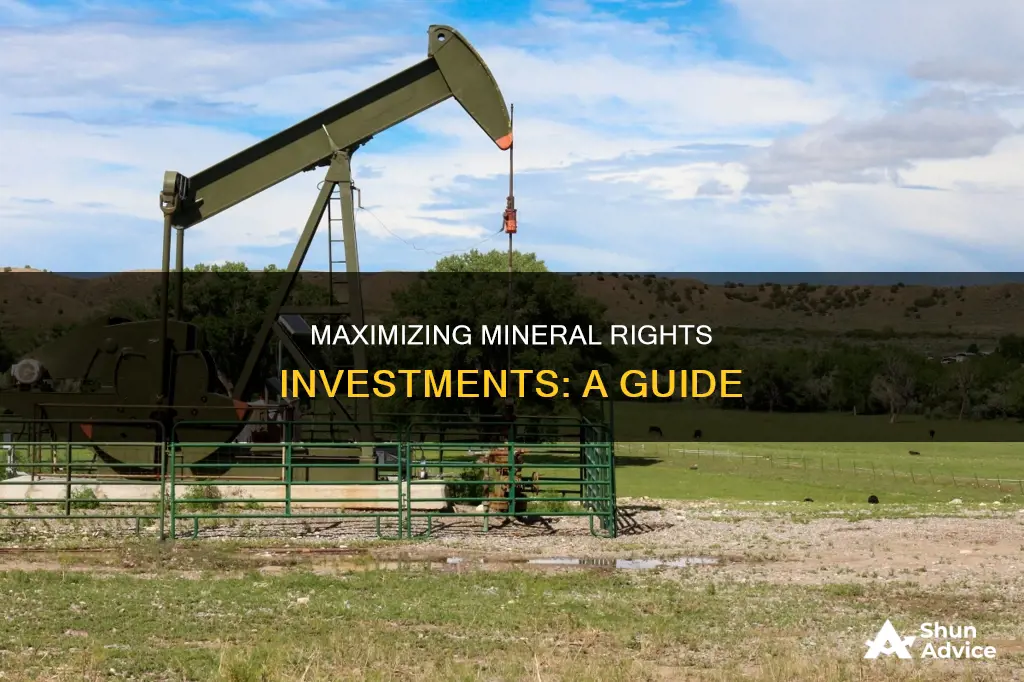
Mineral rights refer to the ownership of underground resources such as metals, fossil fuels, and mineable rocks. Mineral rights are often separated from surface rights, meaning that mineral rights owners have the right to extract minerals or receive payment for their extraction. Investing in mineral rights can be a good way to generate passive income and diversify one's portfolio. However, it is important to conduct thorough due diligence before investing, as there are risks associated with mineral rights ownership, including environmental and regulatory issues.
What You'll Learn

Understand the risks and pitfalls
Mineral rights ownership can be a lucrative investment, but it is not without its risks and challenges. Here are some key considerations to be aware of before investing in mineral rights:
- Commodity Price Risk: Mineral rights investments are heavily influenced by commodity prices, particularly oil prices. When oil prices are high, unconventional extraction methods become more economical, increasing the value of mineral rights. However, commodity prices fluctuate, and a decline in prices can negatively impact the proceeds of your investment.
- Exploration and Extraction Challenges: A significant amount of exploration is required to extract minerals, and there is no guarantee that sufficient minerals will be found to justify the investment. Technological advancements have lowered drilling risks and increased returns, but accidents, machine failures, and environmental concerns can affect profitability.
- Regulatory and Legal Issues: Regulations and legal issues can arise unexpectedly and impact your investment. Ensure you are familiar with the legal framework governing mineral rights in the relevant jurisdiction, and be aware of any regulatory or environmental issues that may affect your investment.
- Political Instability: Political instability or changes in government policies can negatively affect your investment. This is particularly relevant in jurisdictions where mineral rights are owned by the government, as changes in leadership or policies may impact your ability to extract and profit from those resources.
- Technological Obsolescence: Keep abreast of technological advancements as they can affect the quantity of extracted minerals. For example, newer horizontal wells produce larger quantities of hydrocarbons but have shorter economic lives than conventional vertical wells.
- Market Downturns: Selling mineral rights can become challenging during market downturns, as the number of buyers may decrease. Ensure you have a comprehensive understanding of the market and seek expert advice before investing.
- High Capital Investment: Investing in minerals often requires a substantial amount of capital. Carefully consider your financial position and seek financing options if necessary. Only invest what you can afford to lose, as there is a risk of not actualizing your invested funds.
- Due Diligence: Conduct extensive due diligence before purchasing mineral rights. Research the location, geology, production maps, and lease terms. Engage professionals such as landmen, geologists, reservoir engineers, CPAs, and attorneys to assist in the process.
- Lease Terms: Many mineral owners do not hire attorneys to negotiate lease terms, which can result in unfavourable agreements. Carefully review and negotiate lease terms with the help of a qualified attorney to ensure your interests are protected.
- Title Search: Perform a thorough title search to verify the seller's ownership and the accuracy of mineral ownership claims. This process can be time-consuming and expensive, but it is essential to avoid purchasing minerals from someone who does not own them or owns less than what they claim.
Shiba Investors: A Community's Power
You may want to see also

Research and due diligence
Understand Mineral Rights
Firstly, it's crucial to understand what mineral rights are and how they work. Mineral rights refer to the ownership rights of underground resources such as metals, fossil fuels (oil, natural gas, coal, etc.), and mineable rocks. These rights are legally distinct from surface rights in many places, including some US states like Texas, Oklahoma, and Pennsylvania. When investing, be sure to familiarise yourself with the specific laws and regulations surrounding mineral rights in your desired location.
Conduct Thorough Research
Before investing in mineral rights, conduct extensive research on the location and the specific mineral deposit you're interested in. Inspect the land to ensure it has viable mineral deposits, and evaluate the quality and quantity of those deposits. Consider the costs of extraction and processing, as well as the current and future market demand for the minerals. Additionally, study the trends and challenges of the industry to make informed decisions.
Evaluate the Operator
If you plan to collaborate with an extraction company, carefully evaluate their reputation, financial strength, and work experience. Some operators have terrible reputations and may cause unnecessary headaches and legal battles. Choose a company with a strong track record and a capable team.
Due Diligence Checklist
When purchasing mineral rights, due diligence is of utmost importance. Here is a checklist to guide your process:
- Geology and engineering review: Analyse the geology and engineering aspects of the site to assess the viability of mineral extraction.
- Lease and operator review: Examine the lease agreement in detail, looking for clauses that may be problematic or favour the operator.
- Royalty statement analysis: Review royalty statements to understand the expected monthly revenue and cash flow.
- Title search: Conduct a thorough title search to verify the seller's full and valid ownership of the mineral rights.
- Outgoing conveyance review: Ensure that the legal descriptions match the rights being conveyed or deeded.
- Regulatory compliance: Check for any regulatory or environmental issues associated with the mineral rights and ensure compliance with local laws.
Consult Experts
Don't hesitate to enlist the help of professionals such as landmen, geologists, reservoir engineers, CPAs, and attorneys. Their expertise can provide valuable insights and help you avoid potential pitfalls.
Smart Investing for the Rest of Us
You may want to see also

Tax benefits and implications
Investing in mineral rights can be a great way to generate passive income, but it's important to understand the tax implications of your investment.
Mineral rights ownership comes with several tax benefits and implications. Mineral rights are considered "real property," similar to real estate, and are subject to certain tax rules and regulations. Here are some key points to consider:
- Tax-Free Investments: Investing in mineral rights is often considered a tax-free investment. Mineral owners typically do not pay any expenses or drilling liabilities, which can result in significant tax advantages.
- Tax Treatment of Royalties: Royalties received from mineral rights are generally treated as ordinary income and are subject to both state and federal taxes. However, there may be opportunities to defer taxes on royalty income through IRS tax codes or other tax strategies.
- Basis and Capital Gains: When selling mineral rights, it's important to determine your basis, especially if you inherited the rights. Your basis is the amount of your capital investment in the property, and it affects the calculation of capital gains taxes. Consult a tax professional to accurately determine your basis and tax liability.
- 1031 Exchange: Mineral rights can be sold through a 1031 exchange, which allows for the deferral of capital gains taxes. However, there are strict rules and timelines that must be followed when completing a 1031 exchange.
- Reporting and Disclosure: When selling mineral rights, it is the responsibility of the mineral owner to report and disclose the transaction for tax purposes. While the buyer is not required to issue a 1099 form, it is important to consult with a tax professional to ensure proper reporting and compliance.
- Inheritance and Stepped-Up Basis: If you inherit mineral rights, you may receive a stepped-up basis, which means your tax basis in the property is adjusted to the value at the time of inheritance. This can have significant tax implications, especially when compared to collecting royalty income over time.
- Tax Planning: It is crucial to plan for tax implications before investing in mineral rights. Consult a qualified tax professional or accountant to understand the specific tax consequences of your investment and to ensure compliance with tax laws and regulations.
Poor People: Investing Risk?
You may want to see also

Long-term vs short-term investments
Mineral rights are a great investment opportunity for both short-term and long-term investors. Mineral rights give ownership of the mineral assets (metals and fossil fuels) below the surface of an area of land. Mineral rights owners can explore, develop, and extract these minerals, or lease the rights to a company that can.
Short-term Investments
Mineral rights are great for short-term investments as private companies are willing to pay royalties to landowners to extract minerals from their land. Mineral rights leases typically include signing bonuses and upfront payments, providing immediate income for the landowner.
Long-term Investments
For those looking to invest in mineral rights for the long term, revenue-sharing agreements and ongoing royalties can generate income. Even after recovering the initial investment, royalties can continue to be earned as mineral reserves become more scarce, and the value of mineral rights appreciates.
Mineral rights ownership also provides the opportunity for long-term value appreciation as minerals are non-renewable and finite resources. The demand for these resources is expected to continue, and investors can benefit from the potential for long-term growth in value.
Additionally, mineral rights offer passive income, diversification, and a hedge against inflation, making them a valuable long-term investment.
Markets in Turmoil: Investments Down Across the Board
You may want to see also

The different types of mineral rights
Mineral rights are the ownership rights to underground resources such as fossil fuels (oil, natural gas, coal, etc.), metals and ores, and mineable rocks such as limestone and salt. In the United States, mineral rights are legally distinct from surface rights.
There are several types of mineral rights, including:
- Non-producing mineral rights and producing mineral rights: Producing minerals have one or more active oil and natural gas reserves, while non-producing minerals are undeveloped oil, gas, and other natural resources.
- Mineral Interest (MI): In most cases, the property owner automatically owns the mineral rights, and if drilling is to be done on the land, permission and payment must be given to the landowner.
- Royalty Interest (RI): The owner can profit without making expenses. The mineral buyer doesn’t have to pay upfront or make other expenses like creating or drilling a well. If the owner leases the rights to an oil and gas company, they get royalty payments until the work is done.
- Overriding Royalty Interest (ORRI): The owner only receives royalties as long as production is ongoing on the land.
- Working Interest (WI): The WI gives the owner the right to explore the land. However, unlike other mineral rights, the owner is required to pay expenses. It can be profitable if the rights are leased to an oil company as they would cover all expenses.
- Non-operated Working Interest: This type of right mostly occurs when the rights are passed down through family members. The owner does not operate the mining machines and can earn money without mineral management.
- Net Profits Interest: This is a type of mineral right that is not very common. The owner only makes money when there is a profit associated with the land area.
Young Investors: Where to Begin?
You may want to see also
Frequently asked questions
Mineral rights are the ownership rights to underground resources such as fossil fuels, metals, ores, and mineable rocks.
Mineral rights owners are paid first, before anyone else, through monthly royalty checks, providing a recurring passive income stream. This allows investors to diversify their portfolios beyond traditional asset classes, while also safeguarding their portfolio against the eroding effects of inflation.
Buying mineral rights is risky and it is important to know what you are doing. The more educated you are about mineral rights and the oil and gas industry, the more likely you are to buy quality minerals at a reasonable price.
There are multiple ways to buy mineral rights, the most common being at auction, from brokers, by negotiated sale, tax sales, and directly from mineral owners.
It is important to conduct research, evaluate the mineral deposit, understand the legal considerations, choose your investment structure, negotiate the terms, understand the production process, and evaluate the operator.







